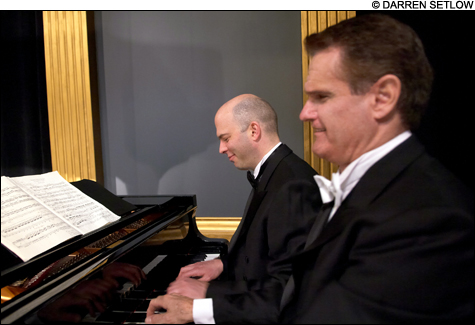
DOUBLE-TIME Actors and pianists both. |
A good bout of slapstick goes on between tuxedoed pianists Ted (Tom Frey) and Richard (Jeffrey Rockwell) before they finally flip back their tails and get into Bach's Concerto in D Minor: First, they skirmish wordlessly over who gets to sit at which baby grand, and then they take some time to one-up each other's warm-up scales. Their foibles are practically vaudevillian, and so, as it turns out, is the trajectory of lessons and practice that got them to this point. We follow the musicians' progress from grade school through adulthood in the entertaining two-man comedy-cum-piano recital 2 Pianos 4 Hands, by real-life pianist-actors Ted Dykstra and Richard Greenblatt, and directed by Tom Frey for Portland Stage Company.
If you think comedy is all about the timing, consider how much timing it takes to play a Mozart sonata with somebody else. Or at all. As Ted and Richard learn their art, they have to contend with time signatures, metronomes, and examiners asking them to beat time in five with one hand and four with the other. Also often troublesome are key signatures and a dizzying array of chords to be identified by ear, the berating of various piano teachers and killjoy parents (all played by either Frey or Rockwell), and their own youthful yearnings to occasionally go play hockey or meet girls. Along the way we also get some interesting grace notes and quirky insider anecdotes. (I particularly liked how their Italian and French teachers illustrate contrasting national standards of virility by way of which arpeggio fingerings they advise.)
Most impressive in 2 Pianos 4 Hands — beyond, of course, the uncommon spectacle of two professional actors who can also breeze through major classical piano compositions — is how convincingly and unromantically it brings us into the minds of two aspiring young musicians. These are talented and driven kids, but they're also really normal in their complaints and shenanigans. What we experience vicariously through them is sometimes irreverent, like the rough-housing that goes on as the two boys play at the same piano, or a kid's-eye view of how a competition judge of unidentifiable foreign nationality keeps pronouncing "piece" as "piss." Other times, the experience is sublime: Watch for the joy of schoolboy Richard's epiphany when he realizes that his boring scale fingerings have a practical application in actual music.
Frey and Rockwell are sensitive to both sides of Ted's and Richard's relationship with music, and they're a real hoot, too. Their physical comedy at the piano — pulling the bench out from each other, slapping each other's heads in time, even giving wet willies, all while they are playing a sonata together — is top-notch, and their caricatures of teachers, parents, and conservatory directors are both funny and humane. They also do well in developing two distinct characters of Ted and Richard, particularly considering that a lot of the characterization happens while they're at the keys. Richard emerges as shyer, more sensitive, and more deferent, while Ted is more brash and prone to use words like "cool" around important conservatory superiors.